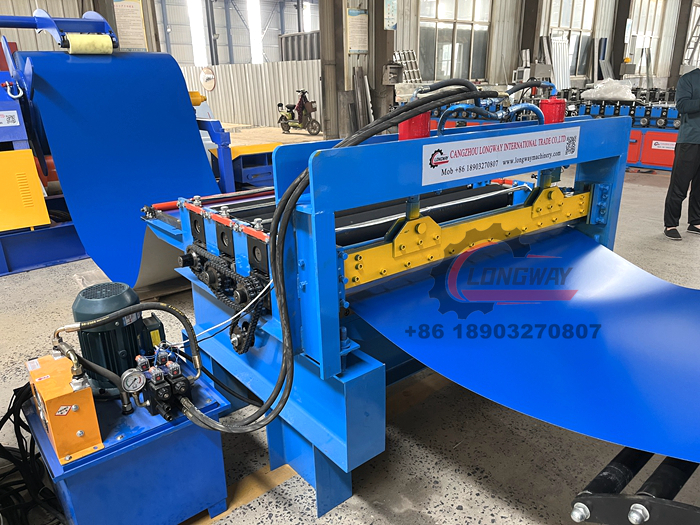Custom Sheet Metal Roll Forming Solutions for Various Applications and Industries
Custom Sheet Metal Roll Forming The Key to Precision Manufacturing
In today's manufacturing landscape, precision and customization are paramount. Among the various methods of metal fabrication, custom sheet metal roll forming has emerged as a highly effective technique for producing complex shapes and profiles with unmatched accuracy. This article explores the intricacies of custom sheet metal roll forming, highlighting its advantages, applications, and the factors to consider when selecting a manufacturing partner.
Understanding Sheet Metal Roll Forming
Roll forming is a continuous bending operation in which a long strip of metal, typically in sheet form, is passed through a series of rollers. Each roller is designed to progressively shape the metal into a final product with a predetermined cross-section. This process is particularly effective for producing parts in high volumes, offering consistent quality and precision.
The primary materials used in sheet metal roll forming include steel, aluminum, copper, and other alloys. These materials are chosen based on their mechanical properties, weight, and corrosion resistance, which can significantly affect the performance of the final product.
Advantages of Custom Roll Forming
One of the most significant advantages of custom sheet metal roll forming is the ability to produce complex shapes that are often difficult or impossible to create using other methods, such as stamping or machining
. This capability stems from the unique design of the rolling mill, which allows for intricate profiles to be formed efficiently.Additionally, roll forming offers several other key benefits
1. Cost Efficiency Once the initial setup costs are covered, roll forming is highly cost-effective for large production runs. The continuous operation can lead to reduced labor and overhead costs, making it an attractive option for businesses looking to minimize expenses.
2. Material Savings The roll forming process generates minimal waste compared to other metal fabrication techniques. This is due to the precise control over material usage, allowing manufacturers to optimize their resources and reduce material costs.
custom sheet metal roll forming

3. High Tolerance Levels Roll forming can achieve tight tolerances and maintain uniformity across long lengths, ensuring that each component meets strict quality standards. This is particularly important for industries that require precise specifications, such as aerospace and automotive.
4. Versatility Custom sheet metal roll forming can accommodate various materials and thicknesses, making it suitable for a wide range of applications. Whether producing simple shapes or complex designs, roll forming offers the flexibility to adapt to different manufacturing needs.
Applications in Various Industries
Custom sheet metal roll forming is used in numerous sectors, showcasing its versatility and effectiveness. Common applications include
- Construction Steel studs, tracks, and roofing components are often produced using roll forming, providing structural integrity and durability. - Automotive Components such as frame rails and brackets, which require precise shapes and strength, are well-suited for roll forming techniques. - HVAC Ductwork and ventilation systems frequently utilize roll-formed parts, promoting efficient airflow and energy conservation. - Electronics Many electronic enclosures and brackets are created using roll forming, ensuring protection and support for delicate components.
Choosing a Manufacturing Partner
When selecting a manufacturer for custom sheet metal roll forming, it is essential to consider several factors
1. Experience and Expertise Look for a company with a proven track record in roll forming and a portfolio demonstrating their capabilities in producing complex shapes. 2. Technology and Equipment Advanced equipment and technology ensure precision and efficiency. Ensure the manufacturer utilizes up-to-date machinery that meets industry standards. 3. Quality Control A robust quality control process is critical to maintaining the standards of the final product. Ask about their inspection methods and certifications. 4. Customization Options Ensure the manufacturer can cater to your specific design requirements and can provide engineering support during the design phase.
Conclusion
Custom sheet metal roll forming is an indispensable technique in today’s manufacturing industry. With its ability to produce high-quality, complex shapes efficiently and cost-effectively, it continues to serve various sectors, from construction to automotive. By understanding the advantages and applications of this process, businesses can leverage roll forming to meet their production needs and drive success in a competitive marketplace.
-
Roof Panel Machines: Buying Guide, Types, and PricingNewsJul.04, 2025
-
Purlin Machines: Types, Features, and Pricing GuideNewsJul.04, 2025
-
Metal Embossing Machines: Types, Applications, and Buying GuideNewsJul.04, 2025
-
Gutter Machines: Features, Types, and Cost BreakdownNewsJul.04, 2025
-
Cut to Length Line: Overview, Equipment, and Buying GuideNewsJul.04, 2025
-
Auto Stacker: Features, Applications, and Cost BreakdownNewsJul.04, 2025
-
Top Drywall Profile Machine Models for SaleNewsJun.05, 2025








